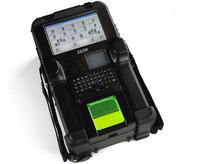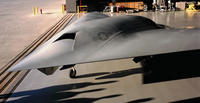-
Morpho's fingerprint algorithms win
Morpho (Safran group) the other day announced that its fingerprint recognition algorithms have been ranked number one in the two most recent National Institute of Standards & Technology (NIST) MINEX II (Match-on-Card) and Ongoing MINEX revaluations; the company says its algorithms excelled in both accuracy and interoperability under all conditions
-
-
Cross Match's SEEK II may have identified bin Laden

SEEK II from Florida-based Cross Match is a 4-pound computer that captures photographs, complete fingerprints, and iris scans; its memory holds the images and biometrics of up to 60,000 people; unconfirmed reports suggest that the Navy SEALs who killed bin Laden used a SEEK II to identify him; there are about 5,000 SEEK II devices in the field, being used by the U.S. military, border patrol, and law enforcement agencies, and also by other militaries
-
-
Smiths Detection launches new radiation detector; president steps down
Last week Smiths Detection unveiled its new hand-held radiation detection device that is capable of more accurately identifying radiological and nuclear threats; the “RadSeeker” is designed to have a wide-range of applications to enable security officials and first responders to detect nuclear threats in addition to scanning cargo for nuclear material; the president of Smiths Group, Smiths Detection’s parent company, announced that he would step down; his decision is a result of weak sales at Smiths Detection
-
-
Morpho Detection purchases Syagen Technology
Morpho Detection recently inked a deal to purchase Syagen Technology, Inc., a firm that specializes in chemical analysis instruments; Syagen’s technology and existing contracts will help bolster Morpho’s position as the industry leader in explosives and narcotics detection; Syagen’s detectors are currently used by airports across the United States to screen passengers and air cargo for explosives; the purchase is still pending approval from the federal government as well as Syagen shareholders
-
-
Goodyear changes blimps to Zeppelins

There are few things more familiar to Americans than the Goodyear Blimp; no major sporting event would be complete without one of these blimps hovering overhead; during its long operational history, Goodyear has built and operated more than 300 airships; currently, the company has a fleet of three blimps, based in Ohio, Florida, and California; these blimps are reaching the end of their operational life, and Goodyear has signed an agreement with German company ZLT Zeppelin Luftschifftechnik to supply Goodyear with airships well into the next decade; the new Goodyear-Zeppelin airships will be slightly larger than the airships in Goodyear’s current fleet, fly faster, carry more passengers, and include state-of-the art avionics and flight control systems
-
-
APDN helps prevent government use of fake microchips
Applied DNA Sciences Inc. (APDN) recently announced that it is working with the U.S. government to prevent the use of counterfeit microchips in mission-critical hardware that can lead to potential life-threatening equipment failures; the company is launching a pilot program in conjunction with the government that is designed to ensure that phony microchips do not enter critical supply chains; with the growth of outsourcing and global production chains, pirated microchips have begun appearing in everything from cell phones to fighter jets; the New York based firm specializes in the development of plant based DNA markers that can be safely inserted into any material to ensure its authenticity
-
-
Phantom Ray completes maiden flight

Phantom Ray, Boeing’s fighter-sized unmanned airborne system (UAS), took to the early morning skies on 27 April at Edwards Air Force Base in California for its maiden flight; Phantom Ray is one of several programs in Boeing’s Phantom Works division, including Phantom Eye, which is part of a rapid prototyping initiative to design, develop, and build advanced aircraft and then demonstrate their capabilities
-
-
25 million more users hit in second cyber attack on Sony

Japanese electronics giant Sony recently announced that hackers successfully broke into its networks and stole sensitive data from more than twenty-five million online gaming subscribers; the announcement comes days after Sony’s admission that seventy-seven million users had their personal information stolen; in the most recent attack, hackers infiltrated Sony’s Online Entertainment network and stole names, addresses, emails, birth dates, and even phone numbers from online gamers; some analysts estimate that the attacks could cost Sony and credit card companies as much as $1 to $2 billion
-
-
Hackers crack Nikon's image verification system
A cyber security firm recently announced that it had successfully hacked Nikon’s image verification system that protects digital photos; ElcomSoft, a cyber security firm, says that its hackers have successfully replicated the electronic signature code from Nikon images allowing it to manipulate photos that still pass authentication tests; Nikon’s Image Authentication System is aimed at verifying digital images to ensure that they have not been tampered with especially when used in forensics, accident reports, or construction documentation; ElcomSoft says that its goal was to raise awareness about the security vulnerability and the company has alerted Nikon to the weaknesses of its system
-
-
Dynasil wins DHS award for radiation detection
Dynasil Corporation’s research division, Radiation Monitoring Devices, Inc. (RMD), was recently named DHS’ small business winner for radiation and nuclear detection for 2011; the award is meant to honor small businesses that are excelling in innovative achievement and demonstrate a commitment to national security; RMD was recognized particularly for its development of two new radiation detection materials, strontium iodide and CLYC crystals; DHS is especially keen to develop these new radiation detection materials as the current industry standard, helium-3, is suffering from major shortages
-
-
Deleted text messages hamper police
The number of text messages grows exponentially; this year, people around the world will exchange five trillion messages; phone companies either no longer keep back up copies of text messages, or keep them for a very short period of time; police is worried that this policy will hobble future investigations
-
-
Intrusion detection company joins chemical society
The growing attention to chemical plants safety leads perimeter security companies to show even more interest in that sector; Senstar, a manufacturer of perimeter intrusion detection technology, joins the Society of Chemical Manufacturers and Affiliates
-
-
Sony's gaming network hacked, Microsoft's follows suit

Gamers are in a frenzy over Sony’s announcement that its PlayStation network security had been breached, resulting in the exposure of a large amount of each user’s personal and financial information; the first of an expected flood of lawsuits, as well as class action is filed in U.S. District Court; Microsoft announces an exploited vulnerability in one of their game titles leading to phishing attempts, and acknowledged that previously banned “modded” consoles were attaching to the network again
-
-
Critical safety and security flaws in airplane maintenance outsourcing
A recent study found that airlines outsourcing their maintenance work could prove to be a major security gap and result in unreliable planes; the Transport Workers Union found that when major U.S. airlines outsource their work they have little training, oversight, or safety measures in place to ensure that the workers they hire perform quality work and do not pose a security threat; at least one member of al-Qaeda has been found working in a major maintenance facility in Singapore in 2003; the lack of training and certification could also result in shoddy airplane repair work; there are only 100 FAA inspectors for over 700 overseas maintenance facilities
-
-
Virtual Imaging: versatile detection at low radiation dosage
Virtual Imaging, a Canon U.S.A. Company, is offering its RadPRO SecurPASS, a full body security screening system that detects and recognizes a range of objects and materials in about eight seconds per person; it uses transmission imaging with an exceptionally low dose of X-rays to scan for dangerous or illegal substances such as liquid explosives, drugs, copper wires, plastic, etc.; its applications range from civil security, that is, airports, seaports, railways, bus stations, to border security, prison security, and high level security as necessitated by nuclear power plants, military premises, and embassies
-
- All
- Regional
- Water
- Biometrics
- Borders/Immig
- Business
- Cybersecurity
- Detection
- Disasters
- Government
- Infrastructure
- International
- Public health
- Public Safety
- Communication interoperabillity
- Emergency services
- Emergency medical services
- Fire
- First response
- IEDs
- Law Enforcement
- Law Enforcement Technology
- Military technology
- Nonlethal weapons
- Nuclear weapons
- Personal protection equipment
- Police
- Notification /alert systems
- Situational awareness
- Weapons systems
- Sci-Tech
- Sector Reports
- Surveillance
- Transportation
Advertising & Marketing: advertise@newswirepubs.com
Editorial: editor@newswirepubs.com
General: info@newswirepubs.com
2010-2011 © News Wire Publications, LLC News Wire Publications, LLC
220 Old Country Road | Suite 200 | Mineola | New York | 11501
Permissions and Policies
Editorial: editor@newswirepubs.com
General: info@newswirepubs.com
2010-2011 © News Wire Publications, LLC News Wire Publications, LLC
220 Old Country Road | Suite 200 | Mineola | New York | 11501
Permissions and Policies
